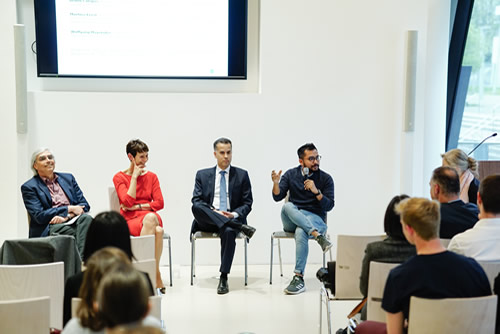 Under the title “Skilled migrants in Austria: Needed but unwelcome?”, the WU Vienna Competence Center for Sustainability Transformation and Responsibility (STaR) hosted its first public panel discussion on 10 April. The event owed its inspiration to the ongoing research on migration at WU Vienna, where several groups of researchers across different academic disciplines are working on topics related to this important issue.
Under the title “Skilled migrants in Austria: Needed but unwelcome?”, the WU Vienna Competence Center for Sustainability Transformation and Responsibility (STaR) hosted its first public panel discussion on 10 April. The event owed its inspiration to the ongoing research on migration at WU Vienna, where several groups of researchers across different academic disciplines are working on topics related to this important issue.
The open-to-public event was followed by a two-day specialized academic workshop on global migration, co-hosted by STaR and the WU Vienna Department of Management, in cooperation with the Journal of World Business. Under the title “Skilled migrants in Austria: Needed but unwelcome?”, the Vienna University of Economics and Business (WU Vienna) Competence Center for Sustainability Transformation and Responsibility (STaR) hosted its first public panel discussion on 10 April. The event owed its inspiration to the ongoing research on migration at the University, where several groups of researchers across different academic disciplines are working on topics related to this important issue.
An introductory note on pressing issues related to global labour migration was given by Aida Hajro (Brunel University London and WU Vienna). The subsequent panel discussion included four speakers from highly diverse cultural and professional backgrounds and offered many valuable insights into the challenges that skilled migrants face in Austria. For example, WU Vienna Prof. Wolfgang Mayrhofer discussed the socio-historical context of Austria as a not-traditionally-immigrant-receiving country and described the difficulties with labour market entry, over-qualification, and higher social acceptance of some migrant groups over others, in relation to the broader societal context. HR expert Martina Ernst listed the major challenges to be met by skilled migrants from the industry perspective. She also commented on the needs of firms that seek to hire qualified migrants (e.g., meeting potential candidates in their home countries, dealing with administrative obstacles, addressing lack of collaboration between the private sector and the government). Finally, Kaiser Ahmed and Bruno Campos – two highly qualified migrants who live and work in Austria – provided real-life examples illustrating the bureaucratic hurdles, societal-level obstacles, and career difficulties; but they also presented opportunities and personal success stories. Overall, all four panelists agreed that concrete infrastructural improvements have to be made in order for Austria to meet its current economic demand for highly qualified workforce.
One major impression, voiced not only by the panelists but also by several people in the audience, was that it is critical to raise more public awareness about the topic. On this note, STaR will search for ways of making the conversation continue, and invites anyone interested in skilled migration (whether or not you have experienced it yourself) to contact them at: This email address is being protected from spambots. You need JavaScript enabled to view it.
